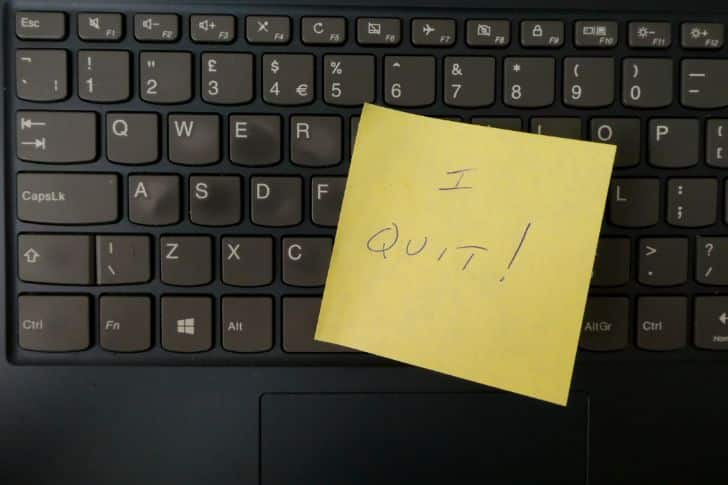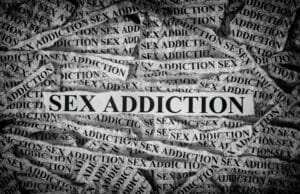
Do you ever wonder why it is so hard to quit porn? Do you feel like you’re the only one who struggles with it? Trust me, you’re not alone.
Now that I’m four years into recovery from my own porn addiction, I like to talk about the solution more than the problem. However, I know that there are a lot of people out there who are still struggling in their own battle against addiction and can’t seem to find the solution. I get it. Quitting porn is hard! I tried breaking my porn addiction over and over again for almost three decades before submitting myself to porn addiction rehab at Desert Solace.
Most people don’t understand porn addiction, and a lot of them don’t even believe that porn or sex addictions are real. When you haven’t been addicted to something, it’s difficult to understand why someone just can’t stop doing it. I’m not really into gambling and it’s easy for me to walk away from a slot machine or blackjack table without feeling drawn back. When I try to understand gambling addiction from that perspective, it’s hard to grasp. But when I relate gambling to my own pornography addiction, I can fully empathize with what the gambling addict feels when he can’t seem to stop.
I believe we all have an addiction to something. For many people, that addiction is just more socially acceptable than gambling or drugs or porn. Have you tried quitting social media? Video games? Netflix? Or caffeine? Think about whatever it is that you do to escape boredom, loneliness, sadness, or other painful emotions, and you’ll find your addiction.
But let’s get back to the topic – why is pornography addiction such a difficult one to overcome? The answer to that question is probably much more complicated than I can get to in a single article, but I’ll give you a few of the main reasons here.
5 Reasons It Is Hard to Quit Porn
1. Learned Patterns from Childhood

This is my number one factor in why it is so hard to quit porn because our childhood experiences typically have a huge effect on our behaviors as an adult. In at least one study, the average age of first exposure to pornography was under 14 years old. That was in 2017 and I would bet that the age continues to drop every year with more and more kids getting smartphones before they get to middle school.
The reason why this matters is because kids that age haven’t yet figured out how to cope with stress or other negative emotions in a healthy way. When a child stumbles on pornography and it gives them a jolt of feel-good hormones running through their brain and body, it makes them feel good. Our mind remembers this experience and stores it for later because one of the mind’s primary purposes is to seek out comfort.
So what happens to that 13 year old the next time he gets stressed, lonely, angry, tired or bored? His mind is going to tell him that he needs to find some comfort, and it will remind him of how great it felt when he looked at pornography. So the 13 year old goes back to pornography, over and over again.
A 13 year old doesn’t have the level of self-awareness that a 30 year old has, so he doesn’t understand why he is continually drawn to look at pornography. He just knows that it makes him feel good.
Many people carry this pattern with them into adulthood after years and years of going to pornography for comfort. Over time, pornography becomes the primary way that person knows how to cope with negative emotions. Once pornography and sex becomes a full blown addiction, the ability to quit porn by yourself is pretty much out of reach.
2. Failure to Address the Underlying Problem
Like I said above, many people don’t understand the nature of porn addiction and think it is just a behavior that can be stopped at any time. Or they believe that the behavior can simply be replaced with another behavior. This oversimplified thinking is why many people still refuse to accept that porn addiction is a real thing. It also makes people feel justified in judging those who can’t simply just stop looking at porn.
What they don’t see, and what many porn and sex addicts don’t understand is that the porn, masturbation and sex are just symptoms of an underlying issue that hasn’t been addressed. Until that underlying issue is resolved, the addictive behaviors will keep coming back.
I can compare it to a medical condition like a brain tumor. Severe headaches and impaired vision are symptoms of brain tumors. But if you went to a doctor and he just told you to take some ibuprofen and wear glasses, it wouldn’t help, right? The symptoms would continue and the brain tumor would keep growing.
With pornography and sex addiction, the problem usually comes from childhood traumas that the addict hasn’t dealt with.

I’m going to take a short moment to talk about childhood trauma because a lot of people see trauma as big, horrific events that happen like abuse, loss of a loved one, or a divorce. I never dealt with any of that stuff in my childhood and I went into recovery thinking my childhood was perfect. But what I discovered was that I had tons of trauma that I didn’t even know was continuing to cause me pain – rejections from friends, bullying, being cut from the basketball team, etc. So don’t make the mistake of writing off childhood trauma as a problem for you just because you didn’t have any major traumatic events in your life.
Back to the topic – if one doesn’t resolve their trauma in a healthy way, they usually go to whatever coping mechanism they know best. So for a teenager who has learned to use porn to cope with negative emotions, he also uses it as a way to numb out from the pain that comes from trauma.
Over the years, those traumas begin to build up inside if they aren’t resolved in a healthy way. I needed more and more porn to deal with my trauma because that was the only thing I knew would make the pain go away. I didn’t understand that I needed to get real professional help to help me resolve the underlying issues that were resulting in me seeking out porn. And that takes me to the next reason quitting porn is so hard.
3. Refusal to Get Professional Help from a CSAT Therapist (or anyone else)

Most people who find it difficult to quit porn aren’t doing anything to get real help for it. I spent 20 years of my adult life hoping I would be able to overcome my porn addiction by myself. I studied loads of self-help books, books about habits, everything I could find to get the “cure” to my porn problem. What I didn’t realize was that my condition needed real, professional help from someone else.
I didn’t know this until I checked myself into rehab, but there are therapists out there who literally spend hundreds of hours being trained to tackle this specific issue. If you’re unfamiliar with what CSAT means, I discussed it in more detail in another post, but briefly, it stands for Certified Sexual Addiction Therapist.
Don’t make the mistake of thinking that any therapist out there will have the solution to your porn addiction. Find one who has specialized in treating porn addiction and other sex addictions and has received the training that goes along with it. To reuse my example above, if you had a brain tumor, you wouldn’t go to a general family doctor to take care of it. You’d want to seek out the best brain surgeon you could find.
Once you have found a good CSAT to help with your porn/sex addiction, you’ll also need good support from other people as well. A lot of people avoid going to support groups because it sounds scary. I hid my addiction for 28 years from other people because I thought they would judge and reject me. Even though I knew that other people at these support groups were dealing with the same problem I had, it was still scary to go there and be open and honest!
But what I found by going to different 12-step support groups was that I was accepted openly. Nobody there judged me for anything I had done. They gave me the support I needed to continue my journey in recovery. Between my amazing CSAT therapist, my wife, and my support groups, I finally felt like I was able to overcome my porn addiction.
4. Self-limiting Beliefs and Identity
I could go into another article about this topic alone, but I believe that my identity and my self-limiting beliefs were a major factor in why I found it so hard to quit porn. At Desert Solace, we see it in every man that walks through our doors.
There’s an old quote attributed to Henry Ford that says, “Whether you think you can or can’t – you’re right.” And the same goes for overcoming a porn or sex addiction. We usually carry around some deep-seated beliefs from our childhood. When I didn’t make the high school basketball team, I told myself that I wasn’t a good athlete. When I lost in the 8th grade spelling bee (on the word mozzarella), I told myself that I wasn’t smart. When I got rejected from the girl I liked in middle school, I told myself that I wasn’t attractive. And after trying to quit looking at porn and failing hundreds of times, I told myself I wasn’t strong enough.
All these beliefs added up to me seeing myself as broken and defective. And that became a part of my identity. I started to identify with my addiction and told myself over and over again that I was an addict and that I would die an addict.
Every so often I could muster up enough motivation to go a month or two without looking at pornography. But because I held a belief that I was an addict and couldn’t ever quit, I always proved myself right. So I would fail again and my beliefs about myself became more and more engrained.
It wasn’t until I met an amazing therapist who told me that I wasn’t defective, I wasn’t broken, that I had just covered up my true self with years and years of negative self-beliefs and a false identity. She helped me see my true nature – that I am not an addict and my behaviors don’t define me. She showed me that I wasn’t chained to my past.
Once I learned that, I finally found a way to forgive myself and I began to love myself for who I was. I stopped identifying myself as an addict and saw myself as person who had experienced addiction. My self-limiting beliefs haven’t completely gone away, but they hold way less power over me than they did before.
5. Environment

Whether you are aware of it or not, your environment has a huge influence on your behavior. Your brain is always looking for shortcuts to make life easier, so it begins to associate certain environments with certain behaviors – a gym is where we work out, a bed is where we sleep, a shower is where we shower. I’m sure you’ve noticed how much thinking you get done in the shower. That is because your brain doesn’t have to spend any extra energy figuring out what to do in the shower. It already knows. So your mind is free to wander.
The problem this creates is when you look at porn over and over again in certain places, like in your home office, or on the computer at work, your brain begins to associate those places with looking at porn. Since looking at porn gives you huge amounts of reward chemicals in your brain, it becomes that much more enticing to keep acting out in those spots. Eventually, every time you sit down at the computer at home, the urges become overwhelming to act out.
This is why going to a residential porn rehab center can be so helpful. Getting out of your home and work environments that are so full of triggers gives your brain time to reset and rewire itself. It’s amazing how easy it can be to quit porn when you’re not exposed to triggers all day long.
When I got home from porn rehab, I was very aware that the environmental triggers I dealt with before leaving were still there. So I did everything I could to change my home and work environment. I switched my furniture around, slept on the other side of the bed, switched bathroom sinks with my wife, changed my clothing to the other side of the closet, and I even took the door off my office at work. I did everything I could to keep my mind from wanting to go back to my old patterns of acting out in certain spots.
This is one of the traps that a lot of men fall into after leaving inpatient porn rehab – they feel really strong in their recovery because they haven’t acted out in a few months and they don’t think they’ll fall back into old habits. So they don’t do anything to change their environment. Eventually, the influence of their environment becomes too strong and they end up falling again.
It takes a long time and a lot of awareness to overcome old environmental cues, but it is possible. Creating a new environment that is conducive to recovery is a major step in overcoming porn and sex addiction.
It is hard to quit porn, but it is also possible. There is Hope!
At Desert Solace we understand how hard it is to quit porn! That’s why we do what we do! It’s important that you know that you don’t have to suffer in silence. It takes a bit of courage to reach out, but trust me when I say that reaching out is the best thing you can do for yourself and your life. There is hope and recovery from porn addiction is possible. We’re here to help you on that journey!
Read More Articles on Porn Addiction Recovery

Benefits of a Certified Sex Addiction Therapist
There are a number of fields where certified training for professionals is quite valuable to the people who utilize their services, and sex addiction therapists

Is Sex Addiction a Mental Illness? Key Considerations
There are several questions that often arise among those who deal with sex addiction or others close to them, and some of them revolve around

Why is Pornography So Addictive?
It’s common for those struggling with addiction or those close to them to wonder exactly how a given form of addiction can take such a